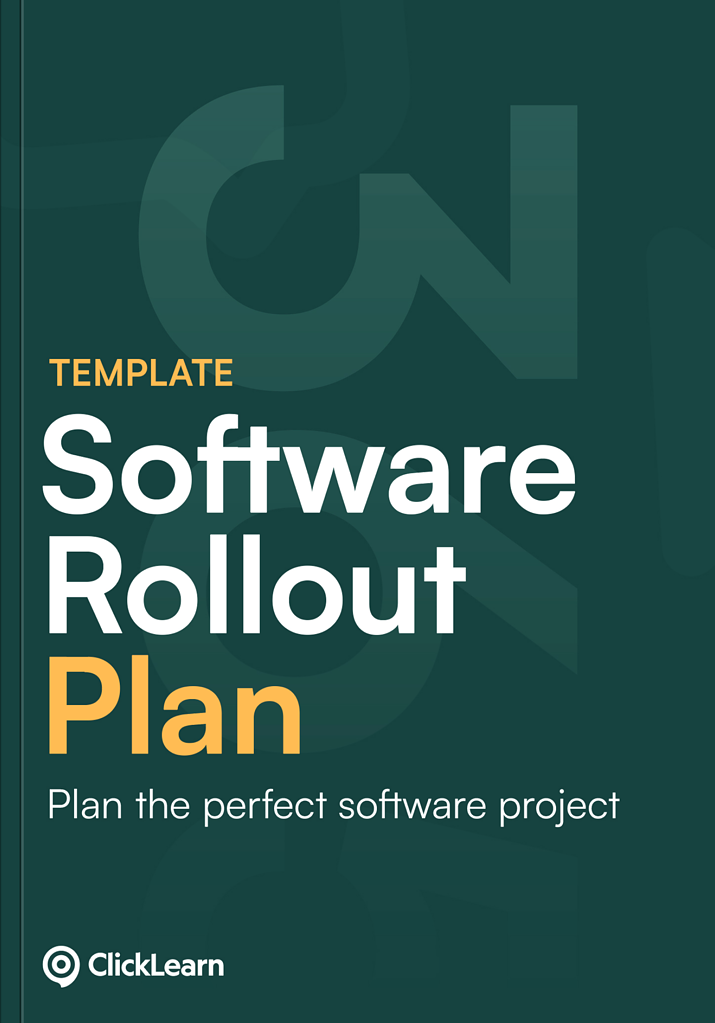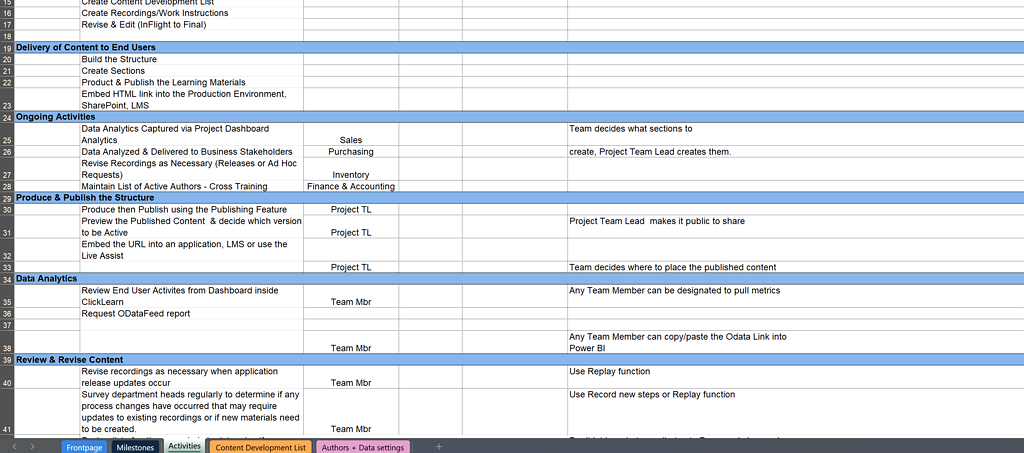Streamline your Oracle software implementation
Free template: Oracle Software Rollout Plan
Achieve a successful Oracle software deployment with a structured rollout plan!
Rolling out Oracle software solutions, such as Oracle Cloud ERP, Oracle E-Business Suite, or Oracle NetSuite, requires careful planning and coordination. We’ve simplified the process with a detailed template designed to help you manage milestones, align stakeholders, and support user training effectively.
Our Oracle software rollout template provides a clear framework to guide your project — from pre-launch preparation to post-implementation support.

- Expert-designed Oracle template
This template, created by implementation expert Christine Eltz, is built on years of experience supporting successful Oracle software deployments. Whether you’re implementing Oracle Cloud ERP, Oracle E-Business Suite, or another Oracle solution, this proven template provides a solid framework to manage your project effectively.
- Trusted by professionals
Project managers across industries have successfully used this rollout plan to guide their Oracle implementation projects. From financial systems to enterprise resource planning, this template is designed to help you manage complex deployments with confidence.
- Immediate access
Download the template instantly and start building your Oracle software rollout plan today — no delays, no waiting. Take control of your Oracle deployment now!


Great companies use ClickLearn
Best practices for a smooth Oracle software rollout
A successful Oracle software rollout plan requires careful preparation, technical precision, and strong user adoption strategies. Follow these best practices to ensure a seamless Oracle implementation:
Develop a comprehensive rollout plan
Break your Oracle deployment into clear phases — from data migration and system configuration to training and go-live support. Outline milestones, timelines, and key deliverables to keep your Oracle project on track.Engage stakeholders from the start
Oracle solutions often impact multiple departments. Ensure that key stakeholders — including IT teams, finance leaders, and end-users — are involved early to align objectives and define success criteria.Conduct thorough testing
Oracle systems are highly configurable, making rigorous testing critical. Test your Oracle solution across various scenarios to confirm data accuracy, integration points, and security settings.Deliver effective user training
Oracle platforms often include powerful but complex features. Providing tailored training — from finance teams using Oracle Cloud ERP to HR teams navigating Oracle HCM — ensures users are confident and capable.Monitor and adapt post-launch
Use Oracle’s built-in monitoring tools and user feedback channels to track performance, identify issues, and adjust configurations as needed. Ongoing monitoring ensures your Oracle deployment aligns with business objectives.
The role of feedback in a successful Oracle software rollout
User feedback plays a vital role in ensuring your Oracle software rollout plan delivers the intended results. Oracle solutions solutions often integrate with multiple business-critical processes, making it essential to gather feedback throughout the implementation.
To effectively integrate feedback:
Establish clear feedback channels. Create dedicated communication pathways where users can report issues, suggest improvements, or ask questions. Oracle’s collaboration tools, email updates, and regular check-in meetings are effective ways to keep feedback flowing.
Incorporate feedback into development cycles. Oracle platforms are highly customizable. Use early feedback during your pilot phase to fine-tune configurations, user interfaces, and automation rules to match real-world needs.
Keep stakeholders informed. Share insights from user feedback with key decision-makers to demonstrate your commitment to improving Oracle system performance. Highlight how adjustments have enhanced functionality or resolved concerns.

How to create an effective Oracle software rollout plan
A clear and well-structured rollout plan is essential for a smooth Oracle software implementation. Follow these key steps to build a successful strategy for deploying Oracle Cloud ERP, Oracle E-Business Suite, or other Oracle solutions:
Define clear objectives
Identify the primary goals for your Oracle software implementation. Whether it’s streamlining financial processes, enhancing supply chain management, or improving data reporting, clear objectives will guide your rollout strategy.Map out key milestones
Break the deployment into defined phases, including system configuration, data migration, testing, user training, and go-live. Establish measurable targets for each phase to track progress and address potential delays.Develop a strong communication strategy
Oracle rollouts often involve multiple teams across your organization. Establish clear communication protocols to ensure that IT teams, end-users, and key stakeholders stay informed throughout the rollout.Prepare for potential roadblocks
Anticipate potential challenges such as data migration issues, integration errors, or user resistance. By creating contingency plans, you can proactively address these hurdles and keep your Oracle deployment on track.Implement feedback mechanisms
Build in processes to gather feedback during pilot phases and after the official rollout. Oracle’s reporting tools and dashboards can help you collect insights and make data-driven adjustments to improve system performance.
Common mistakes in Oracle software rollout plans
Even with a solid plan in place, certain mistakes can undermine the success of your Oracle software implementation. Avoid these common pitfalls to ensure a smooth deployment:
Skipping critical testing
Oracle platforms are highly customizable, making rigorous testing essential. Skipping or rushing this phase can lead to data discrepancies, reporting errors, or performance issues. Test all key processes, including data migration, role-based permissions, and integrations with third-party systems.
Neglecting stakeholder communication
Oracle software rollouts often impact multiple departments. Failing to keep stakeholders informed can create confusion and resistance. Regular status updates, Q&A sessions, and clear documentation can prevent this.
Inadequate user training
Oracle systems like Oracle Cloud ERP and Oracle E-Business Suite offer complex functionalities that require proper guidance. Provide role-specific training tailored to finance teams, sales professionals, or technical staff to ensure confident system usage.
Ignoring feedback from end-users
Overlooking user feedback can result in workflow inefficiencies or missed opportunities to improve system performance. Establish clear channels for collecting feedback and use insights to refine your Oracle environment.
Take control of your implementation
Download Oracle Software Rollout Plan
Achieve a seamless and organized Oracle software deployment with our expertly designed template. This structured plan equips you with the key steps, milestones, and strategies needed to manage your Oracle Cloud ERP, Oracle E-Business Suite, or other Oracle software rollout with confidence.
Don’t leave your Oracle implementation to chance — download the template now and take control of your rollout from start to finish!
Frequently asked questions on Oracle software rollout
An Oracle software rollout plan is a structured framework designed to guide your organization’s Oracle implementation. It outlines key milestones, stakeholder responsibilities, and strategies to ensure a smooth transition to Oracle systems like Oracle Cloud ERP, Oracle E-Business Suite, or Oracle NetSuite.
Oracle solutions are often integrated with business-critical processes such as finance, HR, and supply chain management. A structured rollout plan helps manage complexities, minimize downtime, and ensure successful adoption.
Focus on strategic planning, thorough testing, and effective user training. Engaging stakeholders early and actively gathering feedback throughout the process are also key to a successful rollout.
Common challenges include data migration errors, integration issues, and resistance to change. Address these risks by implementing a detailed testing phase, maintaining clear communication, and providing tailored user support.
The timeline varies depending on the complexity of your Oracle system and your organization’s size. Smaller rollouts may take a few weeks, while larger enterprise deployments can take several months.


